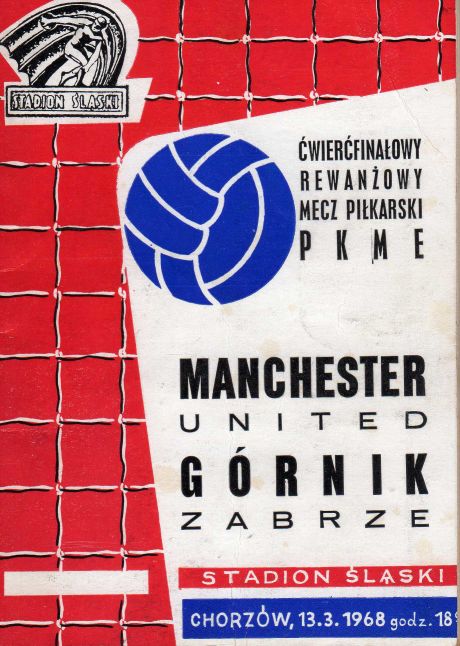Today, Manchester United is one of the top football clubs in the world. It was no different in March, 1968 when the famous Red Devils came to Poland for the second-leg quarter final of the European Champion Clubs’ Cup. The first match played at Old Trafford on February 28th ended 2:0 for the English team. Even so, the Polish fans hoped for a successful rematch and the commentators for a great sporting event. With 90 thousand spectators present, on Wednesday of March 13th, Górnik won 1:0 (after Włodzimierz Lubański’s goal) at the Silesian Stadium in Chorzów, but it was not enough to go through to the semi-finals.
Footballers welcome, journalists not so much
Fans and journalists were excited about the event, but the Communist government had bigger issues than one of the most important football matches in Polish history. After all, March of 68’ was a very tense time for the country. It is understandable, that the protests, so uncommon in other countries ruled by the Communists, gathered a lot of attention in the West. News agencies after news agencies applied to the Polish authorities for visas for their journalists and reporters. Since the very beginning, they were all being rejected. On March 14th, 9 journalists from France, Norway, USA and Great Britain were denied visas. Furthermore; on March 19th, the Third Division of the Border Traffic Directorate of the Ministry of Foreign Affairs rejected visa appeals of the next 40 journalists from Australia; France; Netherlands; Israel; Japan; Canada; Federal Republic of Germany; USA; Switzerland; Sweden and Great Britain. Among the people who were not allowed to enter the country was a French journalist from the “Paris Match” daily magazine, a daughter of the French ambassador in Cracow, who wanted to visit Poland for the first time in her life, Patricia Marie Michele Le Caruyer de Beuvais. A two-day temporary visa was issued for one of the Greek reporters, who also had never been to Poland before.
Not until the 13th of March had “The Times” magazine journalist, Richard William Davy come to Poland. He intended to spend his holidays in the Polish mountains at Zakopane between March 5-9, and then for the next week or two gather information in Warsaw for articles describing the economy of the Communist ruled country. Even though, he was allowed to come on March 4th, Davy did not spend his furlough in the mountains. Immediately after landing in Poland he focused on his work. General Eugeniusz Dostojewski from the Border Traffic Directorate complained about the journalist: “during his stay in Poland, he prepared several tendentious articles which were, among other things, exploited by the Radio Free Europe, basing them on his own observations and many personal connections.” It is easy to guess, how such articles could have been received by the Communists in light of March events. As a result, the journalist had to leave Poland already on March 16th, since his visa was shortened. It is quite clear, that our country was being extremely (and efficiently!) isolated from the outside world.
